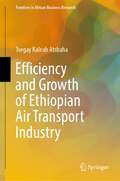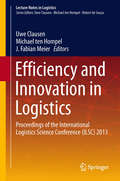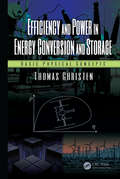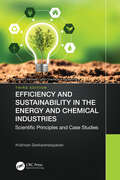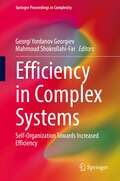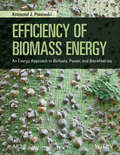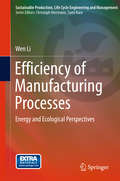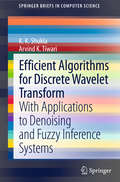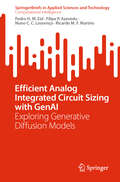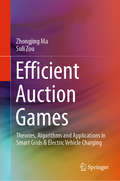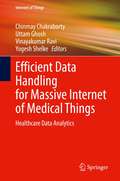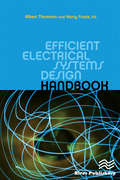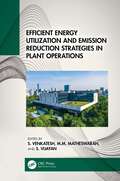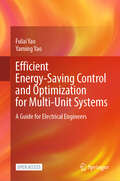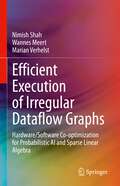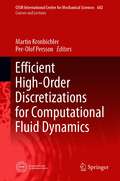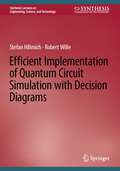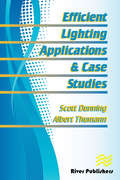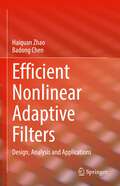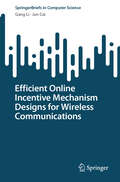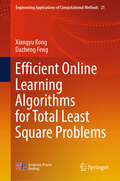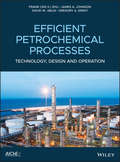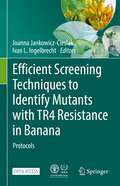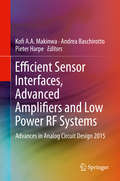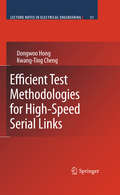- Table View
- List View
Efficiency and Growth of Ethiopian Air Transport Industry (Frontiers in African Business Research)
by Tsegay Kaleab AtsbahaThis book evaluates the efficiency and growth of the Ethiopian air transport sector through careful analysis. It provides essential research input for air transport industry practitioners in planning and resource management as well as for academics of advanced efficiency analysis who need to work and study in airports and the airline industry. The book analyzes the theoretical and practical implications of air transport growth determinants, airports' cost and production efficiency, including labor use efficiency by taking their respective determinant factors. The findings and policy implications of each research work provide important inputs for government policymakers and air transport planners to consider the causality of economic growth versus airlines growth and other determinants, to take lessons on the proper resource allocation in the application of airport cost and production efficiency, human capital, investment cost, price of capital, and labor inputs during the development and expansion of airports and airlines. This book is the first of its kind on the Ethiopian air transport industry and serves as a much-needed reference for the African air transport industry as well as other developing countries in terms of airport costs, production, labor use efficiency and airline growth perspectives.
Efficiency and Innovation in Logistics: Proceedings of the International Logistics Science Conference (ILSC) 2013
by Michael Ten Hompel Uwe Clausen Fabian MeierThe importance of logistics in all its variations is still increasing. New technologies emerge, new planning methods and algorithms are developed, only to face a market with a growing complexity and the need of weighting monetary costs against ecological impact. Mastering these challenges requires a scientific viewpoint on logistics, but always with applications in mind. This volume presents up-to-date logistics research in all its diversity and interconnectedness. It grew out of the "International Logistics Science Conference" (ILSC) held in Dortmund in September 2013, bringing together leading scientists and young academics from nine different countries. The conference was jointly organized by the "Efficiency Cluster Logistics" and the "Fraunhofer Institute for Material Flow and Logistics". The Program Committee used a double blind review process to choose the 12 strongest contributions, which were then grouped in four areas: - Sustainability logistics, including electric mobility, smart information, communication technologies and corporate social responsibility management - Intralogistics, including the detection of autonomous vehicles, 3D computer vision and sensor functions for forklift trucks - Transport logistics, including distribution centre organization, delivery performance in railway systems and logistics reference modelling - Logistics facilities, including environmental impact of container ports, parcel sorting systems and model based systems engineering.
Efficiency and Power in Energy Conversion and Storage: Basic Physical Concepts
by Thomas ChristenThis book provides fundamental theoretical concepts for the understanding, the modelling, and the optimisation of energy conversion and storage devices. The discussion is based on the general footing of efficiency-power relations and energy-power relations (Ragone plots). Efficiency and Power in Energy Conversion and Storage: Basic Physical Concepts, is written for engineers and scientists with a bachelor-degree level of knowledge in physics. It contains: <li>An introductory motivation of the topic <li>A review on equilibrium thermodynamics <li>A primer to linear non-equilibrium thermodynamics and irreversible processes <li>An introduction to endo-reversible thermodynamics <li>The basics on the theory of Ragone plots <li>Derivations of efficiency-power relations or Ragone plots for illustrative examples like heat engines, batteries, capacitors, kinetic energy storage devices, solar power, photodiodes, electro-motors, transformers, and flow turbines <li>An excursion to impedance matching and the optimization of technical devices with respect to economic and related objectives
Efficiency and Sustainability in the Energy and Chemical Industries: Scientific Principles and Case Studies (Green Chemistry and Chemical Engineering)
by Krishnan SankaranarayananUsing classic thermodynamic principles as the point of departure, this new edition of a popular resource supplies the understanding and tools required to measure process ef ciency and sustainability with much improved accuracy. Exploring the driving forces in the chemical and power industries, Efficiency and Sustainability in the Energy and Chemical Industries: Scientific Principles and Case Studies, Third Edition investigates why losses occur and explains how to reduce them. It focuses on the changing roles of refining and chemicals in industry and how the industry is transforming itself, and considers economics as a key enabler to look at technology choices and whether shareholder returns will be there. • Includes new chapters on plastics recycling technologies and challenges, low carbon energy sources, the changing energy mix, and project economics, taxes, and subsidies. • Illustrates techniques with wide-ranging case studies related to energy conversion, mining, and the chemical industries as well as examples and problems. • Considers engineering layouts that reduce the environmental impact of chemical operations. • Explains how to use energy analysis to accurately assess the quality and performance of chemical processes. • Supplies quantitative tools for analyzing sustainability and efciency. • Investigates the challenges of the hydrogen economy and CO2 and low carbon. • Discusses plastics recycling, economics, and a changing energy mix. Complete with the keys to quanti cation of process ef ciency and sustainability, this cutting-edge book is the ideal guide for those engaged in the transition from fossil-based fuels to renewable and sustainable energy sources using low-waste procedures.
Efficiency in Complex Systems: Self-Organization Towards Increased Efficiency (Springer Proceedings in Complexity)
by Georgi Yordanov Georgiev Mahmoud Shokrollahi-FarThis book uses new ideas and language for understanding how self-organization and complexity trend toward increased efficiency. Different measures for efficiency from multiple disciplines are used to probe the ones that provide the most insight. One major goal is to seek a common framework to trace the increase of efficiency as a measure of the level of organization and evolutionary stage of a complex system. The chapters come from a satellite meeting hosted at the Conference on Complex Systems, in Cancun, 2017. The contributions will be peer-reviewed and contributors from outside the conference will be invited to submit chapters to ensure full coverage of the topics. This text will appeal to students and researchers working on complex systems and efficiency.
Efficiency of Biomass Energy: An Exergy Approach to Biofuels, Power, and Biorefineries
by Krzysztof J. PtasinskiDetails energy and exergy efficiencies of all major aspects of bioenergy systems Covers all major bioenergy processes starting from photosynthesis and cultivation of biomass feedstocks and ending with final bioenergy products, like power, biofuels, and chemicals Each chapter includes historical developments, chemistry, major technologies, applications as well as energy, environmental and economic aspects in order to serve as an introduction to biomass and bioenergy A separate chapter introduces a beginner in easy accessible way to exergy analysis and the similarities and differences between energy and exergy efficiencies are underlined Includes case studies and illustrative examples of 1st, 2nd, and 3rd generation biofuels production, power and heat generation (thermal plants, fuel cells, boilers), and biorefineries Traditional fossil fuels-based technologies are also described in order to compare with the corresponding bioenergy systems
Efficiency of Manufacturing Processes
by Wen LiThis monograph presents a reliable methodology for characterising the energy and eco-efficiency of unit manufacturing processes. The Specific Energy Consumption, SEC, will be identified as the key indicator for the energy efficiency of unit processes. An empirical approach will be validated on different machine tools and manufacturing processes to depict the relationship between process parameters and energy consumptions. Statistical results and additional validation runs will corroborate the high level of accuracy in predicting the energy consumption. In relation to the eco-efficiency, the value and the associated environmental impacts of manufacturing processes will also be discussed. The interrelationship between process parameters, process value and the associated environmental impact will be integrated in the evaluation of eco-efficiency. The book concludes with a further investigation of the results in order to develop strategies for further efficiency improvement. The target audience primarily comprises researchers and experts in the field, but the book may also be beneficial for graduate students.
Efficient Algorithms for Discrete Wavelet Transform
by K K Shukla Arvind K. TiwariDue to its inherent time-scale locality characteristics, the discrete wavelet transform (DWT) has received considerable attention in signal/image processing. Wavelet transforms have excellent energy compaction characteristics and can provide perfect reconstruction. The shifting (translation) and scaling (dilation) are unique to wavelets. Orthogonality of wavelets with respect to dilations leads to multigrid representation. As the computation of DWT involves filtering, an efficient filtering process is essential in DWT hardware implementation. In the multistage DWT, coefficients are calculated recursively, and in addition to the wavelet decomposition stage, extra space is required to store the intermediate coefficients. Hence, the overall performance depends significantly on the precision of the intermediate DWT coefficients. This work presents new implementation techniques of DWT, that are efficient in terms of computation, storage, and with better signal-to-noise ratio in the reconstructed signal.
Efficient Analog Integrated Circuit Sizing with GenAI: Exploring Generative Diffusion Models (SpringerBriefs in Applied Sciences and Technology)
by Pedro H. M. Eid Filipe P. Azevedo Nuno C. C. Lourenço Ricardo M. F. MartinsThis book focuses on the automation of analog integrated circuit design, particularly the sizing process. It introduces an innovative approach leveraging generative artificial intelligence, specifically denoising diffusion probabilistic models (DDPM). The proposed methodology provides a robust solution for generating circuit designs that meet specific performance constraints, offering a significant improvement over conventional techniques. By integrating advanced machine learning models into the design workflow, the book showcases a transformative way to streamline the process while maintaining accuracy and reliability.
Efficient Auction Games: Theories, Algorithms and Applications in Smart Grids & Electric Vehicle Charging
by Zhongjing Ma Suli ZouThis book focuses on the design of efficient & dynamic methods to allocate divisible resources under various auction mechanisms, discussing their applications in power & microgrid systems and the V2G & EV charging coordination problems in smart grids. It describes the design of dynamic methods for single-sided and double-sided auction games and presents a number of simulation cases verifying the performances of the proposed algorithms in terms of efficiency, convergence and computational complexity. Further, it explores the performances of certain auction mechanisms in a hierarchical structure and with large-scale agents, as well as the auction mechanisms for the efficient allocation of multi-type resources. Lastly, it generalizes the main and demonstrates their application in smart grids. This book is a valuable resource for researchers, engineers, and graduate students in the fields of optimization, game theory, auction mechanisms and smart grids interested in designing dynamic auction mechanisms to implement optimal allocation of divisible resources, especially electricity and other types of energy in smart grids.
Efficient Data Handling for Massive Internet of Medical Things: Healthcare Data Analytics (Internet of Things)
by Chinmay Chakraborty Uttam Ghosh Vinayakumar Ravi Yogesh ShelkeThis book focuses on recent advances and different research areas in multi-modal data fusion under healthcare informatics and seeks out theoretical, methodological, well-established and validated empirical work dealing with these different topics. This book brings together the latest industrial and academic progress, research, and development efforts within the rapidly maturing health informatics ecosystem. Contributions highlight emerging data fusion topics that support prospective healthcare applications. The book also presents various technologies and concerns regarding energy aware and secure sensors and how they can reduce energy consumption in health care applications. It also discusses the life cycle of sensor devices and protocols with the help of energy-aware design, production, and utilization, as well as the Internet of Things technologies such as tags, sensors, sensing networks, and Internet technologies. In a nutshell, this book gives a comprehensive overview of the state-of-the-art theories and techniques for massive data handling and access in medical data and smart health in IoT, and provides useful guidelines for the design of massive Internet of Medical Things.
Efficient Electrical Systems Design Handbook
by Albert Thumann Harry FranzNow you can achieve optimum performance and efficiency in the design of electric systems for virtually any size or type of building or industrial facility utilizing the state-of-the-art methodologies detailed in this comprehensive handbook. Step-by-step guidelines take you through each phase of design, covering equipment selection, power distribution system analysis, conduit and conductor sizing, lighting system design, control systems, electronic instrumentation, protective relaying, energy management systems, power quality, variable speed drives, motor selection, and more. The latest codes (NEC 2008) as well as currently available equipment are referenced. Numerous examples and simulation exercises are included, along with detailed design examples. Fully illustrated with many useful diagrams and tables, this book is a practical guide for electrical engineers, plant and facility engineers, and other professionals responsible for implementing or overseeing the design of facility electrical systems.
Efficient Energy Utilization and Emission Reduction Strategies in Plant Operations
by S. Venkatesh S. Vijayan M. M. MatheswaranEfficient Energy Utilization and Emission Reduction Strategies in Plant Operations summarizes technological advancements in effective energy utilization in plant operations. It provides optimal geometrical parameters to design emission control equipment for minimum energy consumption.Focusing on current and emerging technological innovations for improving the energy efficiencies of processes in several industries, such as manufacturing, mining, dairy, and other processing industries, this book explores pollution control and design methods for low-carbon environments. It also covers reductions in greenhouse gas emissions through innovative co-production of bio-oil in combined heat and power plants.This book will be a useful reference for graduate students and academic researchers in the fields of energy management, plant operations, sustainable engineering, environmental engineering, and mechanical/industrial engineering.
Efficient Energy-Saving Control and Optimization for Multi-Unit Systems: A Guide for Electrical Engineers
by Fulai Yao Yaming YaoThis open access book focuses on energy efficiency optimization control methods and energy efficiency optimization methods. The mathematical proof of the multi-unit operation energy efficiency prediction theory and engineering application solutions are given. By analyzing the commonalities of the efficiency curves of different devices and using the quantum optimization method proposed in the book, a nonlinear, integer-real-number mixed energy efficiency optimization method under constrained conditions has been demonstrated. Twelve application cases, including hydropower plants, transmission networks, distribution stations, water pumping stations, high-speed trains, electric vehicles, electric ships, central air conditioning systems, central heating systems, wind power hydrogen production and multi-engine rockets, have been studied in detail. A key feature of this book is that the energy efficiency optimization of the system can be achieved without establishing a complex mathematical model of the multi-unit system, this method is simple, practical, widely applicable and versatile. It is particularly suitable for readers who are interested in learning about energy efficiency optimization and energy saving and carbon reduction solutions. This book can benefit researchers, engineers and graduate students in the fields of electrical and electronic engineering, control engineering, power engineering and energy engineering.
Efficient Execution of Irregular Dataflow Graphs: Hardware/Software Co-optimization for Probabilistic AI and Sparse Linear Algebra
by Marian Verhelst Wannes Meert Nimish ShahThis book focuses on the acceleration of emerging irregular sparse workloads, posed by novel artificial intelligent (AI) models and sparse linear algebra. Specifically, the book outlines several co-optimized hardware-software solutions for a highly promising class of emerging sparse AI models called Probabilistic Circuit (PC) and a similar sparse matrix workload for triangular linear systems (SpTRSV). The authors describe optimizations for the entire stack, targeting applications, compilation, hardware architecture and silicon implementation, resulting in orders of magnitude higher performance and energy-efficiency compared to the existing state-of-the-art solutions. Thus, this book provides important building blocks for the upcoming generation of edge AI platforms.
Efficient High-Order Discretizations for Computational Fluid Dynamics (CISM International Centre for Mechanical Sciences #602)
by Martin Kronbichler Per-Olof PerssonThe book introduces modern high-order methods for computational fluid dynamics. As compared to low order finite volumes predominant in today's production codes, higher order discretizations significantly reduce dispersion errors, the main source of error in long-time simulations of flow at higher Reynolds numbers. A major goal of this book is to teach the basics of the discontinuous Galerkin (DG) method in terms of its finite volume and finite element ingredients. It also discusses the computational efficiency of high-order methods versus state-of-the-art low order methods in the finite difference context, given that accuracy requirements in engineering are often not overly strict. The book mainly addresses researchers and doctoral students in engineering, applied mathematics, physics and high-performance computing with a strong interest in the interdisciplinary aspects of computational fluid dynamics. It is also well-suited for practicing computational engineers who would like to gain an overview of discontinuous Galerkin methods, modern algorithmic realizations, and high-performance implementations.
Efficient Implementation of Quantum Circuit Simulation with Decision Diagrams (Synthesis Lectures on Engineering, Science, and Technology)
by Robert Wille Stefan HillmichThis book provides an easy-to-read introduction into quantum computing as well as classical simulation of quantum circuits. The authors showcase the enormous potential that can be unleashed when doing these simulations using decision diagrams—a data structure common in the design automation community but hardly used in quantum computing yet. In fact, the covered algorithms and methods are able to outperform previously proposed solutions on certain use cases and, hence, provide a complementary solution to established approaches. The award-winning methods are implemented and available as open-source under free licenses and can be easily integrated into existing frameworks such as IBM’s Qiskit or Atos’ QLM.
Efficient Lighting Applications and Case Studies
by Albert Thumann Scott C. DunningWith the increased concern for energy conservation in recent years, much attention has been focused on lighting energy consumption and methods for reducing it. Along with this concern for energy efficient lighting has come the realization that lighting has profound effects on worker productivity as well as important aesthetic qualities. This book presents an introduction to lighting design and energy efficiency which can be utilized while maintaining the quality of illumination. Topics include lighting energy management, selection of lamps, task lighting, lighting design, lighting control, reflectors, ballast selection, natural daylighting, wireless lighting control, and case studies.
Efficient Nonlinear Adaptive Filters: Design, Analysis and Applications
by Badong Chen Haiquan ZhaoThis book presents the design, analysis, and application of nonlinear adaptive filters with the goal of improving efficient performance (ie the convergence speed, steady-state error, and computational complexity). The authors present a nonlinear adaptive filter, which is an important part of nonlinear system and digital signal processing and can be applied to diverse fields such as communications, control power system, radar sonar, etc. The authors also present an efficient nonlinear filter model and robust adaptive filtering algorithm based on the local cost function of optimal criterion to overcome non-Gaussian noise interference. The authors show how these achievements provide new theories and methods for robust adaptive filtering of nonlinear and non-Gaussian systems. The book is written for the scientist and engineer who are not necessarily an expert in the specific nonlinear filtering field but who want to learn about the current research and application. The book is also written to accompany a graduate/PhD course in the area of nonlinear system and adaptive signal processing.
Efficient Online Incentive Mechanism Designs for Wireless Communications (SpringerBriefs in Computer Science)
by Gang Li Jun CaiThis book initially delves into its fundamentals to initiate the exploration of online incentive mechanisms in wireless communications. Three case studies are provided to elaborate details on designing online mechanism design in practical system. For crowdsensing with random task arrivals, this book introduces a linear online incentive mechanism model with insurance of the quality of information for each incoming task. In the context of edge computing systems, the authors model a nonlinear online incentive mechanism with the consideration of mobile users’ energy budget constraints. It also explores online incentive mechanism for collaborative task offloading in mobile edge computing to achieve on-arrival instant responses. This book not only disseminates current knowledge but also sheds light on future research directions. The design of incentive mechanisms in wireless communication systems is of paramount importance as it encourages dormant terminals within networks to contribute their valuable resources. The consideration of randomness of network processes enhances the mechanism design under online settings and decision making on the fly. This book endeavours to bridge existing knowledge gaps by comprehensively presenting and developing fundamental insights into online incentive mechanisms and their design methods in the realm of wireless communications. It’s one of the first books to provide a comprehensive understanding of the fundamental principles of online incentive mechanisms and their intricately designed methods in the dynamic world of wireless communications. Future research directions include an investigation in the evolving domain of online incentive mechanism designs within wireless communications. This book strikes a balance between theoretical knowledge and practical application, making it a valuable resource for both researchers and practitioners in the field of wireless communications and network economics. Advanced-level students majoring in computer science and/or electrical engineering will want to purchase this book as a study guide.
Efficient Online Learning Algorithms for Total Least Square Problems (Engineering Applications of Computational Methods #21)
by Xiangyu Kong Dazheng FengThis book reports the developments of the Total Least Square (TLS) algorithms for parameter estimation and adaptive filtering. Specifically, it introduces the authors’ latest achievements in the past 20 years, including the recursive TLS algorithms, the approximate inverse power iteration TLS algorithm, the neural based MCA algorithm, the neural based SVD algorithm, the neural based TLS algorithm, the TLS algorithms under non-Gaussian noises, performance analysis methods of TLS algorithms, etc. In order to faster the understanding and mastering of the new methods provided in this book for readers, before presenting each new method in each chapter, a specialized section is provided to review the closely related several basis models. Throughout the book, large of procedure of new methods are provided, and all new algorithms or methods proposed by us are tested and verified by numerical simulations or actual engineering applications. Readers will find illustrative demonstration examples on a range of industrial processes to study. Readers will find out the present deficiency and recent developments of the TLS parameter estimation fields, and learn from the the authors’ latest achievements or new methods around the practical industrial needs. In my opinion, this book can be assimilated by advanced undergraduates and graduate students, as well as statisticians, because of the new tools in data analysis, applied mathematics experts, because of the novel theories and techniques that we propose, engineers, above all for the applications in control, system identification, computer vision, and signal processing.
Efficient Petrochemical Processes: Technology, Design and Operation
by James A. Johnson Frank (Xin Zhu David W. Ablin Gregory A. ErnstThis book covers the application of methods and tools for energy optimization and process design. It focuses the application of these methods on petrochemical process units such as the aromatics process unit. The book provides practical methods and tools to industrial practitioners with the focus on improving industrial energy efficiency, reducing capital investment, and optimizing yields via better design, operation, and optimization. Broken down into six parts the book covers a range of topics including: Aromatics Process Description; Process Design Considerations; Petrochemical Separation Design; Process Integration; Process system optimization; Types of revamps; Equipment assessment; Common operating issues; and Troubleshooting case analysis to name a few.
Efficient Screening Techniques to Identify Mutants with TR4 Resistance in Banana: Protocols
by Joanna Jankowicz-Cieslak Ivan L. IngelbrechtBananas are a staple food for over 500 million people and are also an important cash crop. Fusarium wilt, caused by the fungus Fusarium oxysporum f.sp. cubense, is one of the most destructive diseases of banana globally. Since the 1990s, an aggressive variant of this fungus, called Tropical Race 4 (TR4), severely affected banana plantations in Southeast Asia from where it spread to other continents, including Latin America, where the global banana export market is primarily centred. TR4 is a soil borne pathogen making the disease difficult to contain. The Joint FAO/IAEA Centre of Nuclear Techniques in Food and Agriculture implemented a Coordinated Research Project (CRP) ‘Efficient Screening Techniques to Identify Mutants with Disease Resistance for Coffee and Banana” (2015-2020). This CRP brought together experts from Asia, Europe and Africa in addition to experts of the Joint FAO/IAEA Centre to develop resistance against TR4 through mutation-assisted breeding. Induced mutagenesis is particularly attractive in case of banana since most cultivated bananas are seedless, thus hampering conventional cross breeding.This Open Access book is a compilation of the protocols developed under the CRP specifically for TR4. The first part covers methods for mutation induction, including the integrated use of innovative single-cell culture with mutagenesis techniques. The book also describes up-to-date phenotypic screening methods for TR4 resistance in banana under field-, greenhouse- and laboratory conditions. Finally, molecular and bioinformatics tools for genome-wide mutation discovery following Next Generation Sequencing are also described. Given the imminent threat of Fusarium Wilt TR4 on banana production globally, it is our hope and intention that the book will serve as a timely reference and guide for banana breeders and pathologists worldwide who are committed to the genetic improvement of banana for Fusarium wilt resistance.
Efficient Sensor Interfaces, Advanced Amplifiers and Low Power RF Systems
by Andrea Baschirotto Kofi A.A. Makinwa Pieter HarpeThis book is based on the 18 tutorials presented during the 24th workshop on Advances in Analog Circuit Design. Expert designers present readers with information about a variety of topics at the frontier of analog circuit design, including low-power and energy-efficient analog electronics, with specific contributions focusing on the design of efficient sensor interfaces and low-power RF systems. This book serves as a valuable reference to the state-of-the-art, for anyone involved in analog circuit research and development.
Efficient Test Methodologies for High-Speed Serial Links
by Kwang-Ting Cheng Dongwoo HongEfficient Test Methodologies for High-Speed Serial Links describes in detail several new and promising techniques for cost-effectively testing high-speed interfaces with a high test coverage. One primary focus of Efficient Test Methodologies for High-Speed Serial Links is on efficient testing methods for jitter and bit-error-rate (BER), which are widely used for quantifying the quality of a communication system. Various analysis as well as experimental results are presented to demonstrate the validity of the presented techniques.
